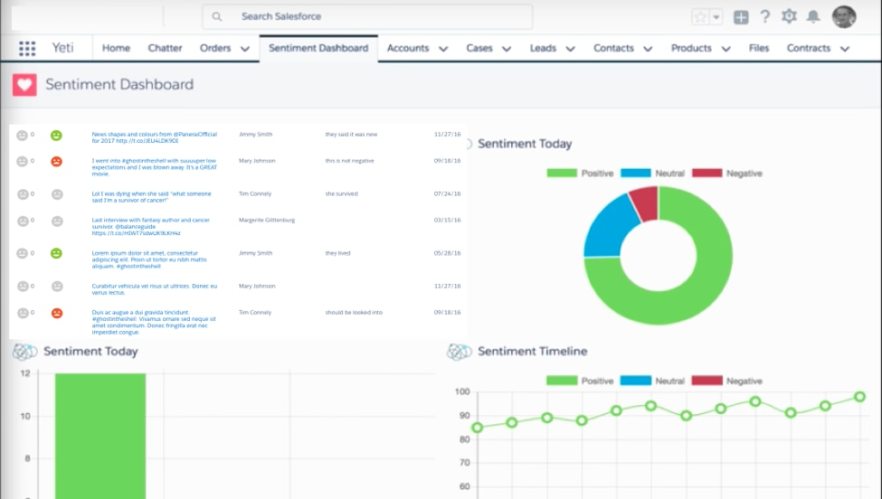Today’s business users demand the same intelligent and predictive app experiences they are accustomed to in their personal lives. This has been part of the impetus for Salesforce Einstein, which brings advanced AI capabilities directly into the Salesforce Platform. Einstein not only makes many of our CRM apps smarter, it also arms developers with the tools to build their own custom, AI-powered CRM apps.
In March we delivered Einstein Image Classification, which enables developers of any skill level to bring image recognition to their apps. Today we are excited to expand our portfolio of Einstein Platform Services, enabling developers to create custom deep learning models from unstructured text and image data, such as customer emails, social media posts and meeting notes. Developers of any skill level can then easily embed these models into any custom app, empowering business users to harness these vast unstructured data sources to gain valuable customer insights and deliver meaningful, predictive experiences. The new Einstein Platform Services include:
- Einstein Sentiment will allow developers to classify the tone of any text—from prospect emails and social media posts to customer reviews and message boards—as positive, negative or neutral so that companies can quickly gain insight into customer attitudes and then take appropriate actions. For example, a cable provider could create a custom app that uses Einstein Sentiment to analyze customer service emails and escalate negative inquires to a supervisor if they reach a certain threshold.
- Einstein Intent will allow developers to train a model to classify the underlying intent of customer inquiries to automatically route leads, escalate service cases and personalize marketing campaigns. For example, a retail company could use Einstein Intent to build a custom app that automatically classifies customer reviews on a community site to identify which customers are looking for product recommendations or experiencing shipping problems and then proactively provide personalized recommendations or tracking details.
- Einstein Object Detection will enable developers to train models to recognize multiple unique objects within a single image, as well as the location, size and quantities of those objects. Einstein Object Detection can be applied to improve customer service, inventory management, and share of shelf analysis. For example, a beverage company can streamline inventory management by automatically analyzing photos of retail shelves to count the product, understand their share of shelf, and then calculate and process a new order.
With Einstein Platform Services any developer can build AI-powered CRM apps. For example, a climbing equipment retailer could embed Einstein Sentiment into a customer service app to classify the tone of inbound customer emails as either positive, negative or neutral. From there, positive responses about the company’s new head lamp could be used to identify brand evangelists or the success of a recent marketing campaign, while negative responses could be automatically escalated into service cases. To make sure each service case is solved quickly, reps could use Einstein Intent in their service apps to classify each negative response and understand the underlying intent of the inquiries– from lost shipments and damaged equipment to billing issues and returned orders. Armed with these insights, the service rep can proactively share shipping information, replace damaged goods and issue a return.
Salesforce is focused on empowering everyone with AI and that includes our more than four million developers. Salesforce Research shares in this mission and is committed to taking cutting edge AI research out of the lab and into the hands of developers so that they can use deep learning to build smarter apps. We’re off to a great start with Einstein Image Classification and I am excited to take that a step further with the extended portfolio of Einstein Platform Services. This is just the beginning and we are working to continue this momentum with future releases.




























